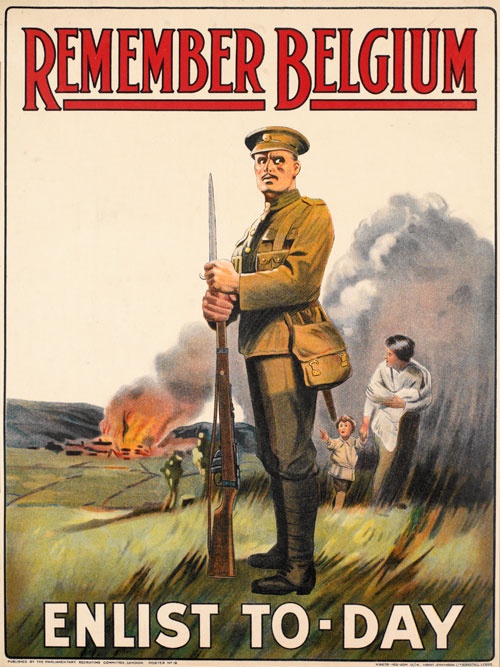
British recruitment poster focusing on atrocities committed by the German Army in Belgium during 1914.
The German Army committed numerous atrocities against the civilian population of Belgium during its invasion and conquest of the country in August-September 1914. Mass killings, including the murder of women and children, were seen as a legitimate response on the part of the German Army to any act of armed resistance by Belgian civilians. Whether such guerilla attacks were real or imagined – and modern scholarship has revealed they were mostly imagined - the effect was to give German troops a licence to pillage and kill with impunity, which they did with a vengeance. Thousands of Belgian civilians were murdered, towns and villages razed to the ground and other violations of international law, such as forcing civilians to act as human shields, also occurred. The worst incidents included the destruction of the town of Dinant (including the deliberate massacre of 674 of its residents), Tamines (383 executed) and Leuven (248 executed). In addition to those murdered more than 100,000 Belgians were forced to become refugees after their homes were deliberately destroyed by the Germans.
The British (and by extension the New Zealand) press seized upon these atrocities and presented them to their readers as evidence of German ‘barbarism’. But the facts were not enough for some journalists and so stories were exaggerated and the focus was blurred by a tabloid-like fixation upon the macabre and the lurid – babies impaled on bayonets, etc – and the more macabre and lurid the better. Encouraged by a jingoistic press the ‘Rape of Belgium’ quickly emerged as a favourite subject of Allied, and in particular British, propaganda. The message was pretty simple – the crimes committed by the Germans in Belgium need to be avenged and, on a more practical note, prevented from ever occurring in Britain (or New Zealand) so join up and do your bit to stop them. This in turn became a favourite target for British pacifist and other anti-war writers from the 1930s onwards who saw it as a prime example of the ‘lies’ used by their government to make men fight. But they refused to acknowledge that the wartime claims, however exaggerated, actually had a basis in fact. In doing so they repeated the crime of gross exaggeration, if not outright lies, that they accused the wartime propagandists of. It was only after the 1970s when English-speaking historians made the effort to consult Belgian and German sources that the truth begin to re-emerge and a sober re-assessment of the war crimes committed by the German Army in Belgium during the First World War could begin.

Community contributions